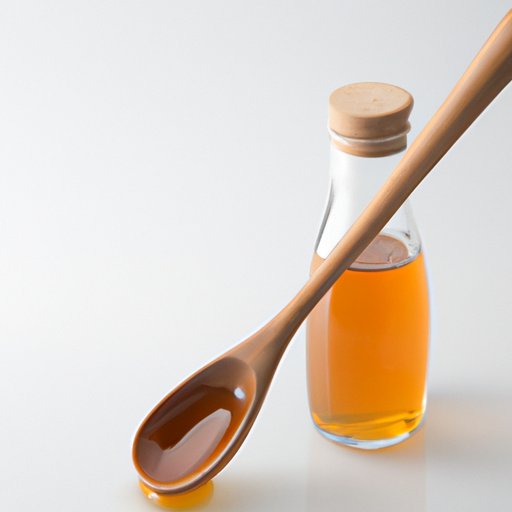Introduction
In recent years, many people have become increasingly aware of the importance of eating a healthy diet. As such, it’s common for individuals to ask questions about the relative merits of various foods and ingredients. One particularly popular debate revolves around whether honey or maple syrup is healthier. In this article, we will take an in-depth look at both honey and maple syrup, exploring their respective nutrition contents, potential health benefits, possible health risks, various uses and applications, environmental impact, and cost-benefit.

Comparing the Nutritional Benefits of Honey and Maple Syrup
The first step in determining which of these two sweeteners is healthier is to examine their nutrient content. Both honey and maple syrup are relatively high in calories, with one tablespoon of honey containing 64 calories and one tablespoon of maple syrup containing 52 calories. However, honey contains slightly more carbohydrates than maple syrup – 17 grams compared to 13 grams.
Honey is also rich in minerals like calcium, iron, magnesium, phosphorus, potassium, sodium, and zinc. Maple syrup, on the other hand, contains fewer minerals but is a good source of manganese. Additionally, honey is higher in antioxidants than maple syrup.
Potential Health Benefits of Consuming Honey and Maple Syrup
Consumption of both honey and maple syrup can offer some potential health benefits. Studies have shown that honey may help reduce inflammation and boost immunity, while maple syrup contains compounds that may help reduce the risk of certain cancers. Furthermore, honey may help improve digestive health and provide relief from allergies, while maple syrup has been linked to improved blood sugar control and reduced cholesterol levels.

Examining the Health Risks Associated with Consuming Honey and Maple Syrup
Despite the potential health benefits of consuming honey and maple syrup, there are some risks associated with overconsumption. For example, both honey and maple syrup contain high amounts of sugar, which can lead to weight gain and increased risk of diabetes if consumed in excessive amounts. Additionally, some people may be allergic to either honey or maple syrup, so it is important to be aware of any potential reactions.
Furthermore, honey should never be given to infants under one year old due to its botulism risk. It’s also important to note that raw honey, which has not been pasteurized, can contain bacteria and other contaminants that can cause food poisoning in certain individuals.
Exploring the Different Uses and Applications for Honey and Maple Syrup
The culinary uses for honey and maple syrup are quite varied. Honey is often used as a sweetener in tea, coffee, and other beverages. It can also be used to sweeten desserts and baked goods, as well as sauces and marinades. Maple syrup is most commonly used to top pancakes and waffles, but it can also be used in baking, glazing, and in savory dishes.
Beyond their culinary uses, honey and maple syrup can also be used for non-culinary purposes. Honey is sometimes used in skincare products due to its moisturizing properties, as well as its anti-bacterial and anti-inflammatory effects. Maple syrup is also used in topical treatments for skin conditions such as eczema and psoriasis.

Investigating the Environmental Impact of Producing Honey and Maple Syrup
The production of honey and maple syrup can have different impacts on the environment. Beekeeping practices, which are necessary for producing honey, can be a significant source of pollution. Pesticide use, water pollution, and destruction of natural habitats are all potential issues associated with beekeeping. Maple syrup production, on the other hand, has fewer environmental implications. The majority of maple syrup is produced in North America, and it requires little energy to harvest and process.
Analyzing the Cost-Benefit of Honey and Maple Syrup
Finally, it’s important to consider the cost-benefit of honey and maple syrup when making a decision about which is healthier. Generally speaking, honey tends to be more expensive than maple syrup. However, the price difference between the two varies depending on the type and quality of honey and maple syrup you purchase.
Additionally, there are other cost considerations to keep in mind. Organic honey and maple syrup are often more expensive than conventional varieties, and some honeys and syrups are labeled “raw” or “unfiltered” and can also be pricier.
Conclusion
To summarize, both honey and maple syrup can offer some potential health benefits. Honey is higher in calories and carbohydrates than maple syrup, and it contains more minerals and antioxidants. When it comes to potential health risks, both honey and maple syrup should be consumed in moderation due to their sugar content. Honey and maple syrup can be used in a variety of culinary and non-culinary applications, and their production can have different environmental impacts. Ultimately, the decision of which is healthier comes down to individual preference and cost considerations.
(Note: Is this article not meeting your expectations? Do you have knowledge or insights to share? Unlock new opportunities and expand your reach by joining our authors team. Click Registration to join us and share your expertise with our readers.)
